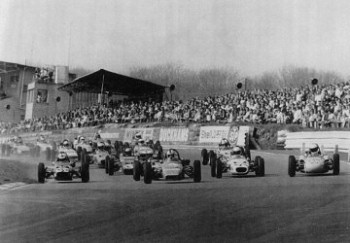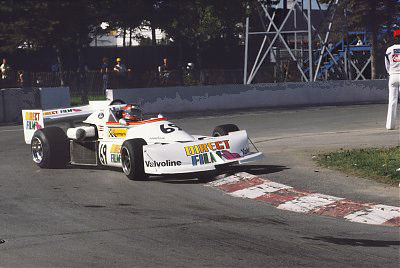The Way It Is/ Go east young man
by Gordon Kirby
©
©
In 1977 and '78 David was hired by Dan Gurney to build, develop and race the Eagle Formula Ford and he won the '78 SCCA FF1600 title in style after breaking away from the field on the opening lap. During the eighties and early nineties he evolved into a first-class sports car racer, winning Camel Light races aboard his own Denali-Mazda and other cars and taking one Sebring 12 hours Lights class win in 1988 and two GTU class wins in 1991 and '92. These days he runs David Loring Racing, focusing on historic racing with a '92 Spice-Chevy GTP car and his restored Denali. He also remains an indefatigable fan of the sport and devoted Motor Sport reader, and as we tucked into coffee and dessert our conversation turned briefly to the state of racing today.
"Back when we started we had the Can-Am, Formula 5000, USAC and Atlantic," David shook his head. "They were all great series in their own right, weren't they? The Atlantic series was tremendous. You had F1 drivers like Depailler, Hunt, Alan Jones and a bunch of French F2 guys come over for Three Rivers and St Felicien, too. We had all those great series and IMSA was pretty good through the eighties and as you well know, of course, CART was a great series for quite a while too."
Before you discount these wistful memories shared by a pair of old codgers I have to emphasize that David was, and is, a real racer. He's a crotchedy old stager who knows how to go racing correctly and insists on doing it right.

Formula Ford in its' heyday, Brands Hatch 1972. David Loring (#55) on
the inside, one wheel in the grass Photo courtesy David Loring collection
Some of the Barber alumni often insisted that personal presentation, charm and saleability were key ingredients in determining the winner. But David and I--joined inevitably by straight-talking racer Dorsey Schroeder--would argue for the pure racer among the group of contenders ahead of the 'right representative' for the Barber school and system. I recall a couple of times amid heated debate when David directly and quickly made his point before storming out of the room we were gathered in for a little fresh air.
Back in the early seventies I helped David run his Caldwell Formula Fords out of the barn behind his parents' house in Massachusetts. In both the USA and Canada in 1970 and '71 and the UK in '72 we encountered huge fields. Thirty and forty-car grids were common and I remember a British championship race on the original, chicane-free Silverstone circuit in 1972 where more than a hundred cars showed up to compete in five or six qualifying heats. In those days many of David's rivals were middle class kids who built and maintained their own cars with the help of family or friends but in the United States in particular Formula Ford has lost its way and in this country is now less than a shadow of its old self.
In today's world there's no room for making your mark in the sport by racing your own car out of the family's barn. Instead of learning your craft by working on every aspect of getting the car to the track as well as racing it, you now have to pay to race in some well-intentioned spec-car series from the Barber series through Formula BMW or Star-Mazda where the cars are prepared by the series or designated teams.
"It's just rich kid racing today," David remarked as we moved on to after-dinner scotches.
In this space in November, Conor Daly made the point that he learned a lot last year about car setup and working with the team by racing in the Canadian FF1600 series in Ontario for Brian Graham Racing.
"The Canadian Formula Ford series was a really good move," Daly said. "It was a great place to learn about the cars. To work with the set-up was really key in my career and it was good preparation to go over to England as well.

© LAT USA
It's instructive to look back at the Alantic series in the seventies when the formula enjoyed a much higher profile in global motor racing than it does today. Back then Atlantic was a direct stepping stone to Formula 1 and the series was followed avidly by fans around the world. Those were by far the formula's most productive years with guys like Villeneuve, Keke Rosberg, Bobby Rahal and Danny Sullivan passing through on their way to fame and fortune.
Gilles drove for Kris Harrison's Ecurie Canada operation in 1974, '76 and '77 but had to run his own car in '75 with wife JoAnn and the kids, Jacques and Melanie, joining him on the road. Famously, he scored his first Atlantic win that year in pouring rain at the remote Gimli, Manitoba airfield circuit. But today it's just not possible to field a low-buck, backyard effort like that capable of winning races.
The pre-ground effect Atlantic cars of the seventies also made a perfect training category for F1 with a good deal of power and very little downforce. The cars could be driven sideways with great verve and the Atlantic series not only put on a great show but provided the primary drawing card at many events. But without any leadership from racing's sanctioning bodies Atlantic slowly began to lose relevance and importance as the ground-effect phenomenom took hold and the cars became much less spectacular to watch.
Power should have been increased to balance out big improvements in downforce. Costs should have been better controlled and prize money and the commercial aspects should have been better managed. But without any serious leadership from the likes of the SCCA, IMSA or CART, the Atlantic series fell into decline, struggling as an orphan for most of its life. Thank God for Vickie O'Connor who kept the series going through a number of tough times and remains the driving force behind the category today.
A despairingly longterm lack of leadership for American open-wheel and sports car racing has resulted in an anarchical ladder system that has changed the nature of the sport in many ways. Whenever any manufacturer wanted to run its own spec car series the sanctioning bodies in the United States and around the world were happy to agree so that there's been a proliferation of increasingly spec car-type formulae over the years from Super Vee and the Opel/Lotus series to F3000, GP2, Indy Lights, Formula Renault and Super Renault, Formula BMW and many others.
In Europe there used to be a clear line of ascension from FF16000 to F3, F2 and ultimately F1. Many championship and non-championship F1 races were accompanied by F3 or FF1600 races. In the sixties and seventies there were three or four events in the UK alone each year featuring F1, F3 and FF1600 races and you could clearly tell who were the best of the up-and-comers. In 1972, David raced his Merlyn FF1600 twice at events where F1 was the feature race, five times with major F2 races and nine or ten times in company with championship F3 races.
Another point is that in sharp contrast to today plenty of Americans were racing in Europe back in 1972. Danny Sullivan started his racing career in Brit Formula Ford that year and went on to race F3 in Europe over the following four years before coming back to the USA to race Atlantic, Can-Am and then Indy cars. Also racing FFs in the UK that year were Denny Shattuck, a friend of David's from Massachusetts who helped us get set-up in England, and another American named John Bicht.

© Jeff Bloxham
Loring had a tough year in 1972 with a tight budget, too many costly crashes and little luck best illustrated when he inadvertantly tore off his visor while leading the first Formula Ford Festival run at Snetterton at the end of the season. But he did manage to win five races and set a track record at Mallory Park that stood for five years. We tred to find the sponsorship to do F3 the next year but struck out and had to come home.
David ran a few FF races here in the USA in '73 and was then offered a life-line by Charlie Williams, a hard-working, impeccably honest man from Kansas City who put David to work preparing and running a Merlyn Atlantic car on a tight budget. The next few years were a struggle for David but neither of us would trade the season we enjoyed in the UK in 1972 for anything. In our separate ways we both learned more about the sport that year than any other year in our lives.
When we were involved in Skip Barber's Big Scholarship run-off I always urged our young drivers to race in Europe, or the UK in particular if it was at all possible. I told them that a season or two in Europe racing against the best young drivers from around the world is invaluable if they're serious about challenging themselves and making themselves better racers. Today, that's probably more true than ever.
So I'm delighted that Josef Newgarden is tackling Brit FF1600 this year. Newgarden took full advantage of Jeremy Shaw's Team USA opportunity to score an excellent win in the Kent division of last October's Formula Ford Festival at Brands Hatch. Josef showed what he's capabale of and I hope he enjoys a good year in the UK and is able to progress u the UK/European ladder. I'd also like to see Conor Daly and some other aspiring young Americans follow Newgarden's tire tracks over the next few years.
Sad to say, today's enfeebled American open-wheel and road racing scene seems destined to contribute little or nothing to international motor sport for many years to come. Decades without leadership have led us to a thoroughly provincial cul-de-sac overhadowed domestically by NASCAR and irrelevant globally.
My advice to any young American racer who wants to break the mold and succeed on the world stage is to go east young man. Go east to Europe.
Auto Racing ~ Gordon Kirby
Copyright 2009 ~ All Rights Reserved
Copyright 2009 ~ All Rights Reserved
Top of Page